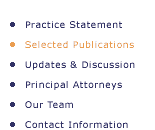
JANUARY/FEBRUARY, 2000
KOREA: Intellectual Property Licenses in Korea
Michael J. Hogg
In the early 1990s, Korea was already in the process of gradually easing its restrictions on licensing. However, there were still significant obstacles. Licences had to be reported to the Ministry of Finance for approval, where applications were reviewed against a long list of terms in international contracts that were considered to be in restraint of trade under Article 32, Paragraph 2 of Korea's Antimonopoly and Fair Trade Law. Prohibited terms included purchase requirements for basic parts and raw materials from the licensor or from suppliers designated by the licensor, restrictions on the sales territory for products manufactured using the licensed technology, restrictions on dealing with competing products, uncompensated grant backs of improvements, and obligations to pay for promotional expenses. Proposed licences for obsolete or low quality technology were not approved. Royalties were usually restricted to 2 to 3% for a term of up to 10 years. Exports of the licensed technology could not be restricted except under certain circumstances, and until 1990 there were severe limitations on trademark licensing.
All that has changed. The provisions of the Foreign Capital Inducement Act (the predecessor to the current Foreign Investment Promotion Act) which took effect in April, 1995, eliminated the need for Korean government approval to import technology except in aerospace and defence. There are still some terms considered to be in restraint of fair trade, but these would not be unfamiliar to trade practice lawyers in Europe or the US. In general terms, restraints on the freedom to set prices and other business terms, restrictions on business activities or market entry, requirements which force licensees to meet sales targets under certain circumstances, and collusive practices are considered to be unfair trade practices.
Prior to the 1990 amendments to the Trademark Act, Korean law required there to be one of the following relationships between a trademark licensor and licensee as a condition of approving a trademark license: equity ownership, a government approved technology inducement or joint venture agreement, or a raw materials supply agreement. Even with a technology inducement agreement, the government would not approve a trademark licence if the principal intent of the arrangement was to license a trademark. Under the current trademark regulation, there are no special provisions directed at a foreign licensor because it is foreign.
While some things may change, others do not. In general, the Korean government may no longer require its approval for the licensing of imported technology (approval may be required if a foreign licensor wishes to seek a tax exemption or if the licence involves aviation, space or a national defence industry). However, licences are still policed by the National Tax Administration. The agency examines technology transfers between a foreign party and Korean entities. It also examines technology transfers between a foreign parent and its Korean subsidiary. Agency examiners review pricing, use and value of imported technology. They look for disguised royalty payments, and for the existence and performance of an actual contract, including approvals if required. They will verify that the contracted technology has in fact been delivered and promised technical assistance provided. No royalties may be paid under a trademark licence unsupported by technical assistance. The tax examiners also check the calculation of tax exemptions and for compliance with export obligations.
It should be noted that the Korean government may approve a five-year tax exemption from corporation taxes on fees paid for high tech products or services, defence, nuclear power and aerospace industry technology based on a foreign technology inducement agreement with a Korean entity. The Korean entity files a report with the relevant ministry and the request for tax exemption should be filed by the foreign licensor.
Since the June 1994 amendments to the Foreign Exchange Management Regulations, and under current foreign exchange rules, the payment of fees to a non-resident under most licences only requires bank confirmation on payment. Despite the lessening of restrictions on foreign exchange transactions, the prudent foreign licensor will confirm in advance whether the payment of licensing fees requires a foreign exchange approval and may well want to condition the licence on the Korean licensee obtaining Korean foreign exchange management approval. The licensor may also want to require the licensee to bear all Korean taxes, except for local withholding taxes, which are statutorily imposed on the foreign licensor in connection with royalty income.
Kyung Taek Jung at Kim & Chang in Seoul contributed to this update
back to top | update index | home
© Copyright 1997-2006, InternationalCounsel. All rights reserved. Disclaimer.